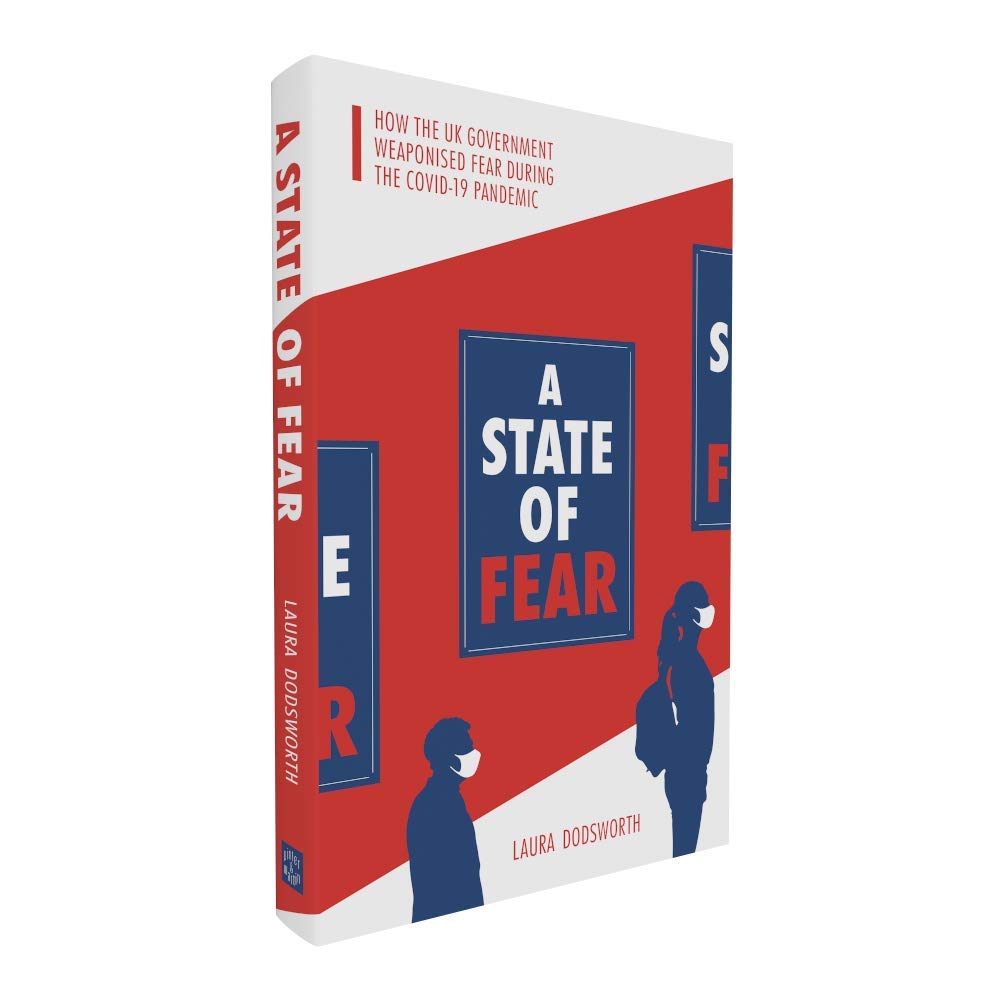
A State of Fear: how the UK government weaponised fear during the Covid-19 pandemic – Laura Dodsworth
This review was first published on Estuary Stirrings
Way back in March 2020 when the Covid-19 crisis first hit, I remarked that a frightened population could be easily manipulated into giving up a lot of their freedoms in return for an illusion of safety and security. Some people did get what I was trying to convey, others were too busy watching fear porn from Wuhan and not taking a step back to critically watch it, and realise that it was staged. For the record, I’ve always accepted that Covid-19 is real but have maintained that the response to it has been disproportionate. Using a sledgehammer to crack a nut is the best analogy I can find to describe what has been done to us over the last fifteen months in ‘dealing’ with Covid-19.
Even as restrictions are being eased, albeit quite possibly only temporarily, looking back to January 2020 and comparing it with the situation we’re in now, it’s staggering how much personal freedom has been lost. As has been noted by the more astute commentators, once a government has assumed a whole host of extra powers during an emergency, real or hyped up, they are very reluctant to relinquish them. Those powers can, and will be used for other purposes…
Resistance to what has been done to us is growing. The most recent manifestation of this was the anti-lockdown / anti-great reset protest that took place in London on Saturday 29 May: A day on the streets… Away from street protests which are not everyone’s cup of tea, there are other forms of resistance where people are ignoring the bewildering array of rules and regulations that have been imposed upon us and instead, are living their lives as they see fit. However, there is still a substantial section of the population that has uncritically accepted the narrative we’ve been fed from the government, SAGE and others. The question is, how did we get to this point?
A State of Fear was written to explain why a substantial section of the population has been bludgeoned into accepting regulations and restrictions that have made many people go from living a full life to merely existing. It doesn’t go into the deeper motives of the government and the other actors involved in this as to what their ultimate goals are. The great reset has been left for other writers and commentators to tackle.
What A State of Fear does brilliantly is forensically expose how the machinery of government was mobilised to instil such a level of fear into the population that they would willingly accept draconian restrictions that have no precedent outside of wartime. It is a very useful, fascinating and quite frankly, frightening insight into how the state can apply a range of resources and techniques to modify the way people think and act. For those of us who instinctively distrust authority, this book more than justifies our fears about the way the state can manipulate and control us.
This book is far from a dry account of how the machinery of the state has been used to control us. Interspersed between the chapters explaining this are personal accounts of how this state of fear and the lockdowns and mask mandates imposed on the back of it has drastically and tragically impacted people’s lives. These accounts range from the impact of the abject fear of venturing outside the home thinking that Covid-19 is everywhere, through to the despair caused by the implication that other people are to be feared as vectors of disease and the devastating atomisation and loneliness this has led to. Those who have supported lockdowns and have called for even harsher measures really need to read and digest these accounts and consider the heartbreak they’ve caused.
I and many others have no idea of how this crisis will play out and how much of a fightback there will have to be to regain our freedoms. It would be tempting to dismiss A State of Fear as nothing more than a snapshot in time. I’m sure there will be many detractors lining up to do just that. It will have a healthy degree of longevity because it forensically unearths how the state used its resources to bludgeon us into a state of fear, and more importantly, what the consequences of that are.
As I’ve pointed out on a few occasions in the past, history is largely written by the winners. We have to make sure we’re the ones that prevail. Hopefully, A State of Fear can play a part in helping us to win the fight that’s ahead of us. It’s a timely and absolutely vital read. On a personal note, after fifteen months where all too often it feels like I’ve been banging my head against a brick wall, having read this book, I now feel vindicated…